Student Life
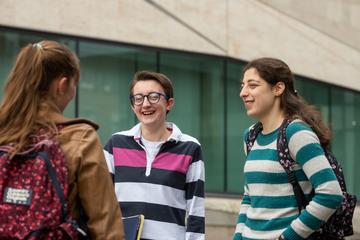
The Department of Earth Sciences is small and sociable, with an intake of around 35 to 40 undergraduates per year. Our students easily get to know their peers and undergraduates in other years.
As a small department, even our lectures are informal. You will quickly get to know your lecturers and demonstrators by name – and vice versa. Field courses are always stimulating – whatever the weather.
The research community, comprising students, researchers, and others, is large and active. There are numerous seminars and research talks, so you will be in touch with the latest developments in the subject.
Oxford University Geological Society (OUGS) is a student-run society, predominantly run by, and for, undergraduate members of the Department. OUGS host a range of events throughout the year, including field trips, academic talks/conferences, ‘Inaccurate Geology Film Nights’ and careers talks. They also coordinate a programme of social events which include cocktail parties (‘Rocktails’), as well as termly celebratory dinners, barbecues, and the yearly grudge match against their Cambridge counterparts (‘GeoVarsity’). The Department is an incredibly close knit community, and OUGS helps to maintain this. The society acts as a conduit for getting to know students from all year groups. OUGS have their own website, with events, helpful information on past mapping projects, and an alternative prospectus.
The most important difference between Oxford and nearly all other universities is the colleges. They may seem an added complication in the application procedure but, in a University with many thousands of students, they provide valuable support, especially when you first arrive. Colleges provide you with opportunities to meet people outside your subject, and access to a wide range of facilities: from libraries and computers, sport, and social events, to accommodation, dining, and welfare. As they each have an undergraduate intake of around one hundred students per year, you quickly get to know your peers. All the colleges are within walking distance of the town centre and the Department.
There is also plenty to do outside college: an immense range of University clubs and societies cater for all tastes, and of course there are the pubs, parks, clubs, and other venues in the Oxford area. Although renowned for its dreaming spires, Oxford is a colourful city, with a face distinct from the University and academia. Oxford has a lot to offer: large enough to cater for most types of entertainment, but everything is within walking distance and you are only ever a short car, bus or bike ride away from the countryside.
Information about undergraduate fees, funding, scholarships and bursaries, living costs, and other financial considerations can be found on the University Fees and Funding webpages.
An independent web database called The Scholarship Hub may have other funding sources for students with particular needs, backgrounds or project areas.
Fieldwork is a core part of the course, and as such, the Department fully funds all the required undergraduate field courses. However, to do justice to your third year mapping project, and some fourth year projects, you may require additional financial support. The following sites and organisations may be of use, though please note the Department is not responsible for the content of these sites, nor any eventual outcomes.
- College Travel Grants – see your individual College for how to apply
- MinSouth & Institute of Materials, Minerals and Mining (IOM3) – offer scholarships and bursaries
- Oxford Geology Group – this local interest group offers modest bursaries for student members
- Oxford Alumni Network Travel Grants – often restricted to students from, or travel to, a particular location
- The Geological Society of London – has numerous funds available to support research and field work projects
Fieldwork requires some basic equipment and clothing. Once you have started your course, but before your first field trip, there will be an ‘Introduction to Fieldwork’ talk. Here you will have the opportunity to ask any questions you might have about the equipment you may nee,d so please don’t worry about having all your equipment and clothing prepared before starting your course.
Equipment
Safety equipment such as helmets, hi-vis vests and goggles are provided by the Department, free of charge. Over the past five years, basic field equipment has been provided for students courtesy of a generous gift from an alumnus. Items that will be provided are:
- Compass clinometer
- Deluxe geolens
- Hard hat
- Safety goggles
- Estwing E322p geological hammer
- Safety vest
- Geo notebook
- Folding rule
- Mapping pen
- Tick twister
- Water bottle
In addition to the items you are given by the department you will also need to purchase:
- Field bag or small rucksack
- Waterproof pen(s), pencils and coloured pencils
- Ruler and protractor
- Clipboard and waterproof plastic sleeve for notebook and maps
- Rucksack
The following items can also be nice to have:
Camera, binoculars, penknife, and a small vacuum flask
Clothing
Fieldwork will take you to a variety of terrains and weather conditions so suitable outdoor clothing is essential, including wind and waterproof clothing, and walking boots that grip well. Clothing can be purchased from outdoor retailers. Remember that not all kit has to be bought new, as second hand items are just as effective and a greener option. Try websites such as Vinted, Depop and Ebay as well as your local charity shop. Make sure to try the kit on before starting the course, particularly walking boots or shoes, to check that items fit comfortably. We are aware this can be a large financial outlay for students so if this is a struggle, please ask for help.
Many colleges have hardship funds available that support the purchase of kit and subject necessities; your tutor should be able to help you with this.
The Mineralogical Laboratory, which contains microscopes used for rock, mineral, and fossil identification.
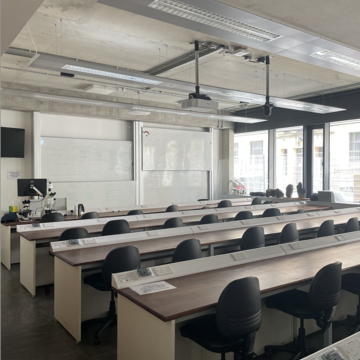
The Elementary Laboratory, which houses geological maps, fossil specimens, and rock samples.
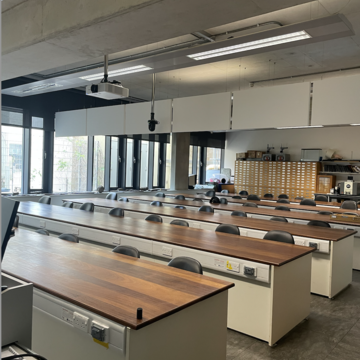
The Computing Laboratory, which is home to high-powered computers used for statistical, geophysical, GIS, and other analyses.
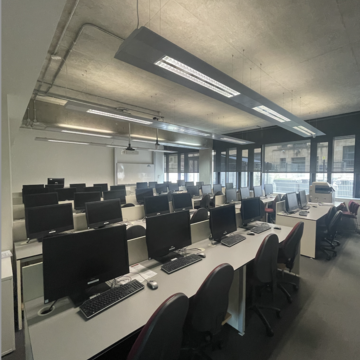
The Seminar Rooms, where most lecture courses occur, in addition to our Departmental seminars.
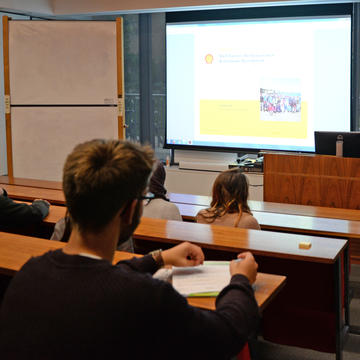
All these rooms have power-sockets available at each seat, to allow students to plug in their own devices, and are accessible to students for independent work at all times when not being used for classes.
In addition to these resources, the Department offers cutting-edge research facilities that can be used by undergraduate students during their fourth year research projects, including our metal-free clean lab for isotopic analysis, mass spectrometers for isotope and trace element analysis, sample preparation facilities such as rock cutting and thin section preparation, and a workshop for manufacturing equipment for work conducted within the Department.
A virtual tour of the department is available here: Earth Sciences Virtual Tour | University of Oxford
The first point of contact for welfare issues in the Department is the Head of Administration and Finance, Hannah Lingard.
Though student health and welfare are primarily college responsibilities, and tutors and other confidential advisers make up a sympathetic and effective network of support for our students, and they should always feel free to approach staff in the Department with any issues or concerns they may have.
Mental Health
Members of Faculty and other Departmental staff care about our students' wellbeing as well as their academic progress, and are here to help. In Earth Sciences we are a close community, and none more so than when we are in the field.
- The Department has trained Mental Health First Aiders amongst its staff
- The University’s Counselling Service can be contacted in order to speak to a Mental Health Professional
- The Student Union has officers working actively to promote student health and welfare
- The Proctors’ and Assessor’s Memorandum, which is available from colleges, provides general information on welfare, finance, health and recreation, as well as on student conduct and on the running of University examinations
- The University also has a number of self-help resources.
Harassment
The Department and the University do not tolerate harassment in any form. The Department has several trained harassment advisers.
The role of harassment adviser is an informal one and intended to be a first point of approach for members of the University. Any discussions are treated in strictest confidence, and the complainant stays in control of the process throughout. Formal action will only be taken if the complainant wishes to pursue it.
The University’s harassment procedures for students are detailed on the University website.
We also expect members of the community to be responsible bystanders if they witness unacceptable behaviour.
External Support
- Nightline is an independent listening, support and information service run for and by students, offering instant messaging, Skype and telephone support
- Samaritans is an independent listening service – always available 24/7 by telephone or online chat
- The NHS Mental Health Helpline is open 24/7 for people who need mental health care when their situation is not life threatening
- Togetherall is an NHS-approved service providing mental health support 24/7 to students, wherever you are in the world. Students can register free with their Oxford email to talk online to a mental health professional using the ‘message a wall guide’ feature or connect with other students through online forums
- Oxford Safe Haven offers short-term support out-of-hours for people in Oxfordshire who are experiencing a mental health crisis including suicidal thoughts, via telephone and face-to-face support
- Students also have the option of speaking to their GP who will have access to wider support and resources




